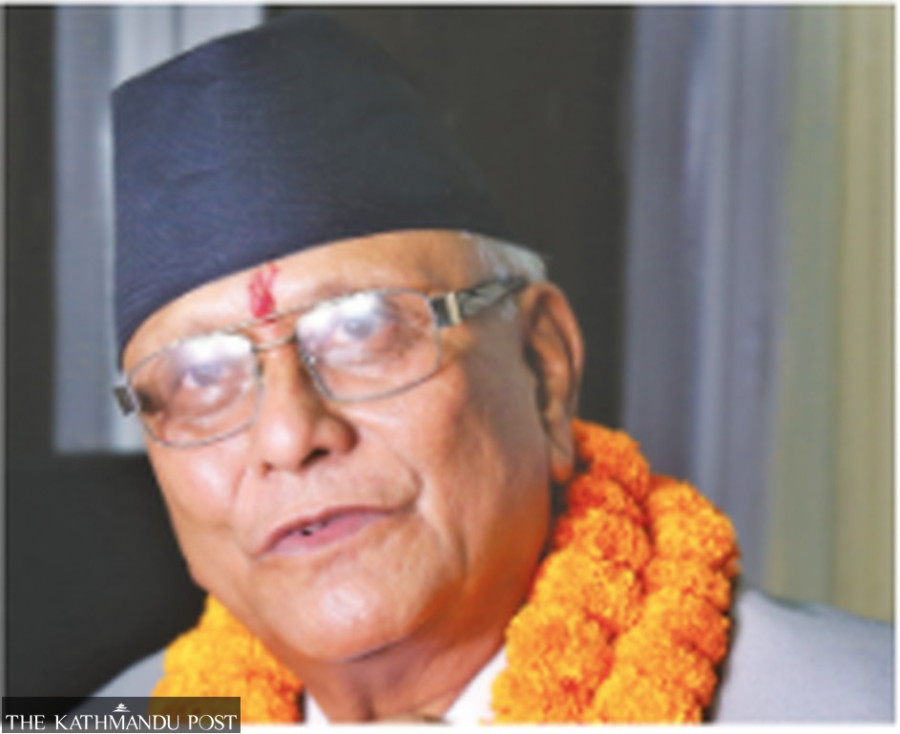Politics
Minister position for non-parliamentarian ‘close to’ chief justice causes uproar
Prime Minister Deuba appoints Gajendra Bahadur Hamal, a district level leader of Nepali Congress, industry minister.
Anil Giri
Prime Minister Sher Bahadur Deuba’s decision to appoint Gajendra Bahadur Hamal, a district level leader of his party, Nepali Congress, a minister has created quite an uproar.
Hamal is one of the 18 ministers appointed by Deuba on Friday, almost three months after he assumed office on July 13.
Deuba gave the full shape to his Cabinet, appointing five ministers from the Congress party, three from the Communist Party of Nepal (Maoist Centre) and four ministers each from the CPN (Unified Socialist) and the Janata Samajbadi Party.
The CPN (Unified Socialist) and the CPN (Maoist Centre) have got one state minister each.
The Nepali Congress already had three ministers and one state minister and the Maoist Centre two.
The appointment of Hamal as minister for industry, commerce and supplies has run into controversy because he is believed to have been the man desired by Chief Justice Cholendra Shumsher Rana in the Cabinet.
Some ruling party leaders including those from the Nepali Congress said that Chief Justice Rana was making a pitch for Hamal.
“Deuba has killed the very essence of democracy,” said senior Nepali Congress leader Dr Shekhar Koirala. “Democracy flourishes when we follow the spirit of checks and balances and separation of powers. The way the principle of separation of powers has been trampled upon poses a serious threat to democracy.”
Just hours before Hamal was inducted into the Cabinet, Minister for Law, Justice and Parliamentary Affairs Gyanendra Bahadur Karki refuted that no one “was becoming a minister from the chief justice’s quota”.
Karki, who was appointed law minister on July 13, now has got the charge of the Ministry of Communication and Information Technology.
The legal fraternity is also dismayed at the decision of Prime Minister Deuba to induct Hamal into the Cabinet.
Though the constitution allows a prime minister to appoint a non-parliamentarian as minister, this provision has been envisaged for appointing an expert on certain issues.
Hamal has no proven expertise.
Now he can serve as a minister for at least six months.
“It is not possible for a district level leader who is not a parliamentarian to become minister,” said an office-bearer of Nepal Bar Association. “We have taken note of this development and are discussing it with due priority.”
“This is an assault on the principle of checks and balances and parliamentary democracy,” advocate Bhimarjun Acharya said. “If the chief justice had sought his share in the Cabinet as reported, this is a serious case.”
“Given the way the chain of events has unfolded, we can say the chief justice has somehow been involved. We lawyers today held a meeting over this issue and we are going to come up with some concrete positions,” said Acharya.
After the ruling alliance finalised the distribution of ministerial portfolios on Thursday evening, Prime Minister Deuba and ruling party leaders received intense support from different quarters to appoint Hamal a minister.
A meeting between Deuba, Maoist Centre chair Dahal, CPN (Unified Socialist) chair Madhav Nepal and Janata Samajbadi Upendra Yadav agreed to award one portfolio to Hamal.
During the meeting, Dahal, Nepal, Yadav and former prime minister Baburam Bhattarai pitched for Hamal as a candidate forwarded by “some power centres” and Deuba agreed, another senior Nepali Congress leader said.
Congress leaders, particularly those close to Deuba, said though the move to appoint Hamal is seen as the prime minister’s “political debacle”, the decision was taken in consultation with the coalition partners.
After Rana pushed for two seats for his favourites in the Cabinet, top ruling party leaders held a series of talks on how to handle the proposal.
But the four top leaders could not resist the pressure from Chief Justice Rana, a leader close to Deuba said.
Since some important cases are pending in the Supreme Court including on the issuance of the ordinance on political parties, KP Sharma Oli’s petition for sacking former UML lawmakers, and cases against the Election Commission for facilitating the UML’s split, ruling party leaders might be fearing some consequences.
“This is not a unilateral decision of Prime Minister Deuba,” Min Bishowkarma, a leader close to Deuba, said. “The decision to induct Hamal was taken after agreement between the top leaders of the ruling parties.”
Senior Congress leader Shekhar Koriala said that the decision to induct a non-parliamentarian and relative of the chief justice to the Cabinet has lowered the morale of millions of Congress leaders, cadres and well-wishers.
“This decision of the prime minister has displeased the entire party rank and file. We came to know about the matter and brought it to the notice of the prime minister, to no avail. We could not understand why he [Deuba] needed Hamal in the Cabinet,” said Koirala.
The primary opposition, UML, has dubbed awarding a non-parliamentarian and someone related to the chief justice a ministerial portfolio “very unfortunate”. The party would take up the matter seriously.
“We are against it. We had also received a similar proposal to appoint a non-parliamentarian a Cabinet member but our chairman KP Sharma Oli resisted and rejected it,” said Subas Nembang, UML’s deputy parliamentary party leader.
“If it is established that Hamal was appointed as proposed by Chief Justice Rana, this will give rise to a wrong political culture. We will see how the media, civil society and other political parties will react and respond.”
+++
Earlier when media had exposed that CJ Rana had forwarded the name of Dipak Timilisina, a former employee of the Supreme Court and Hamal, a team of Supreme Court Bar Association met with CJ Rana and expressed their serious reservation. Then CJ Rana said that he has never pushed the name of Timilsina but Hamal is a Nepali Congress leader and equally fit as Prime Minister Deuba.




 8.79°C Kathmandu
8.79°C Kathmandu














